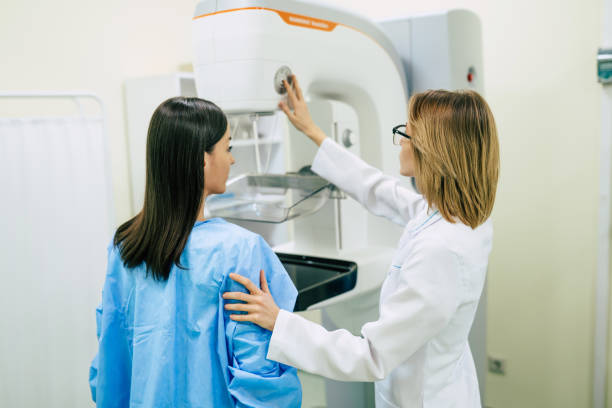
What is Mammography?
Mammography is a specialized medical imaging technique designed to examine breast tissue for abnormalities. It plays a vital role in the early detection and diagnosis of breast cancer, one of the most common and life-threatening cancers among women.
Digital Mammography: Advanced Imaging for Better Results
At Alpha Imaging, we use digital mammography, which captures and stores X-ray images electronically, offering several advantages:
✔ Enhanced image quality for better accuracy.
✔ Faster image retrieval and analysis.
✔ Easier storage and sharing with healthcare providers for efficient diagnosis.
Why is Mammography Important?
Mammography helps detect tumors, cysts, and other abnormalities in breast tissue at an early stage, often before they become noticeable through physical exams. Early detection significantly improves treatment outcomes and survival rates.
Types of Mammography
1. Screening Mammography
Purpose:
✔ Detects breast cancer in women with no symptoms for early intervention.
✔ Recommended for women based on age, family history, or other risk factors.
Procedure:
✔ X-ray images (mammograms) of both breasts are taken to identify any irregularities.
2. Diagnostic Mammography
Purpose:
✔ Used to investigate specific symptoms or abnormalities detected during screening.
✔ Helps evaluate lumps, pain, nipple discharge, or changes in breast size/shape.
Procedure:
✔ More detailed imaging than screening mammography, including additional views for a comprehensive assessment.
Advancements in Mammography
Modern advancements such as digital mammography and tomosynthesis (3D mammography) have improved detection accuracy, reducing false positives and unnecessary biopsies.
Prioritize Your Breast Health
Regular mammograms are an essential part of preventative healthcare. Talk to your doctor about when to start screening and how often you should undergo mammography based on your individual risk factors.
Alpha Imaging is committed to providing precise, high-quality breast imaging for early detection and better patient outcomes.
Patient Information
Why is Mammography Important?
Mammography is a specialized imaging technique designed to detect breast cancer at its earliest stages, often before symptoms appear. Early detection significantly improves treatment success and survival rates.
Mammography Procedure
✔ The breast is gently compressed between two plates to spread out the tissue for clear imaging.
✔ X-ray images are taken from different angles to ensure a comprehensive view.
✔ The entire procedure typically takes about 20 minutes and is performed by trained professionals.
Types of Mammography
1. Screening Mammography
✔ Performed as a routine check-up for women without symptoms.
✔ Aims to detect early-stage breast abnormalities before they can be felt.
2. Diagnostic Mammography
✔ Recommended if a lump, pain, nipple discharge, or other abnormality is found.
✔ Provides more detailed imaging to assist in further evaluation.
How Often Should You Get a Mammogram?
The recommended frequency depends on age, family history, and personal risk factors.
✔ Women over 40: Typically advised to get an annual mammogram.
✔ High-risk individuals: May require earlier and more frequent screenings.
Understanding Your Results
✔ Radiologists analyze mammogram images for signs of lumps, calcifications, or abnormalities.
✔ If further evaluation is needed, additional tests like ultrasound or biopsy may be recommended.
Benefits of Mammography
✔ Early detection increases the chances of successful treatment.
✔ Reduces breast cancer mortality by identifying tumors when they are most treatable.
Are There Any Risks?
✔ Radiation exposure is minimal, and the benefits outweigh the risks.
✔ Some cases may result in false positives, leading to additional tests or biopsies.
Next Steps After an Abnormal Result
✔ Further diagnostic imaging (ultrasound, MRI) or biopsy may be required.
✔ Your healthcare provider will discuss the best course of action for follow-up care.
Prioritize Your Breast Health with Alpha Imaging
Regular mammograms are an essential part of preventive healthcare. Schedule your screening today for peace of mind and proactive health management.
